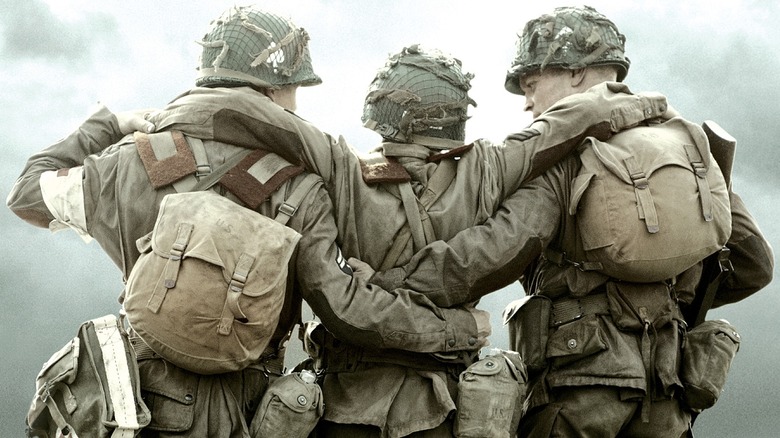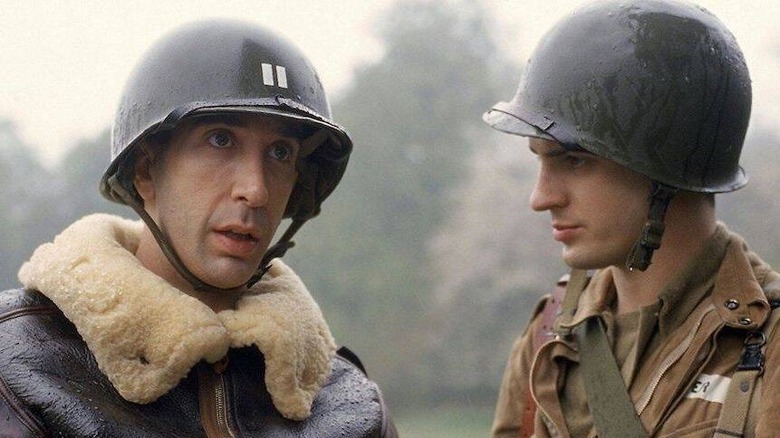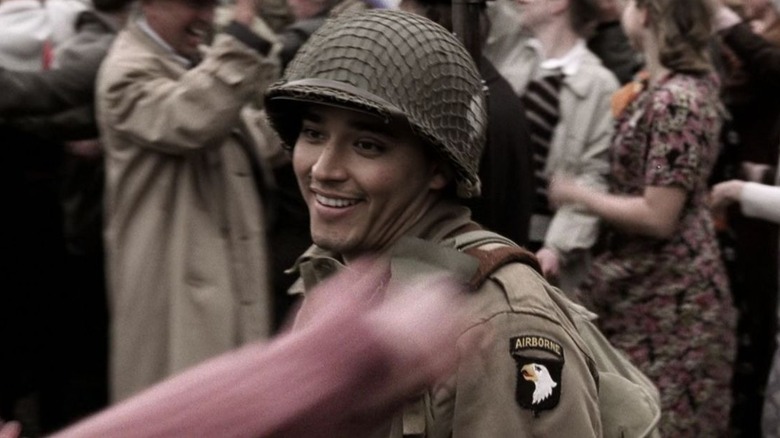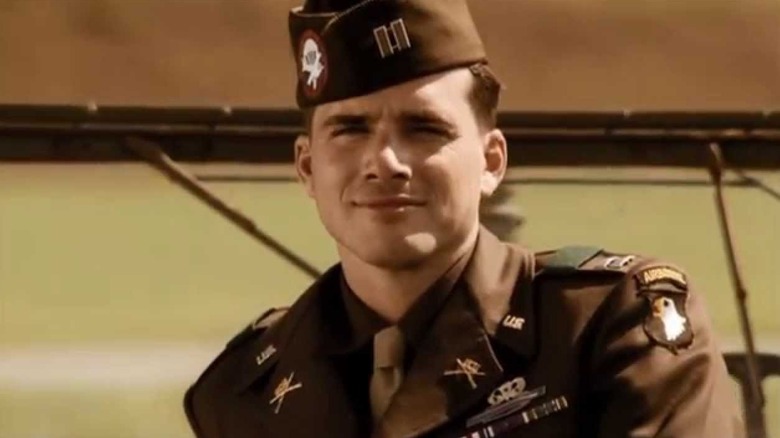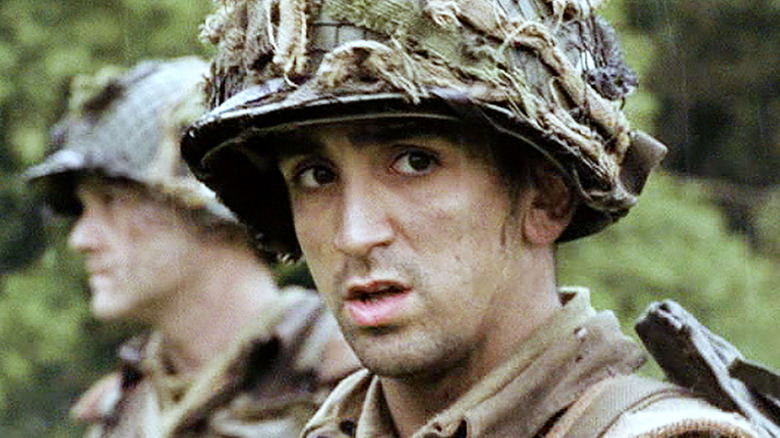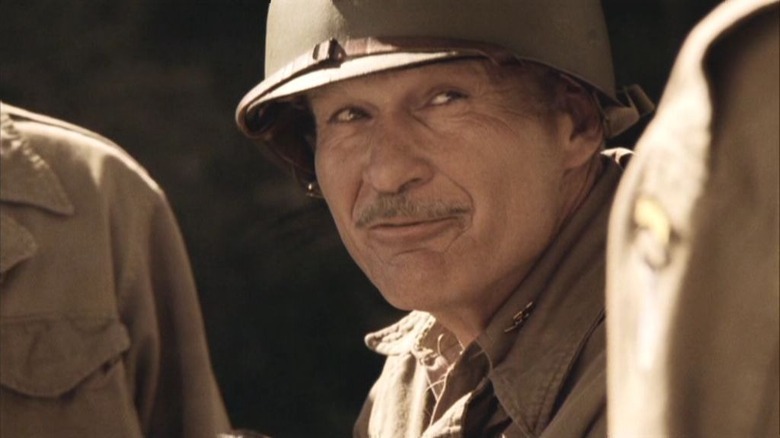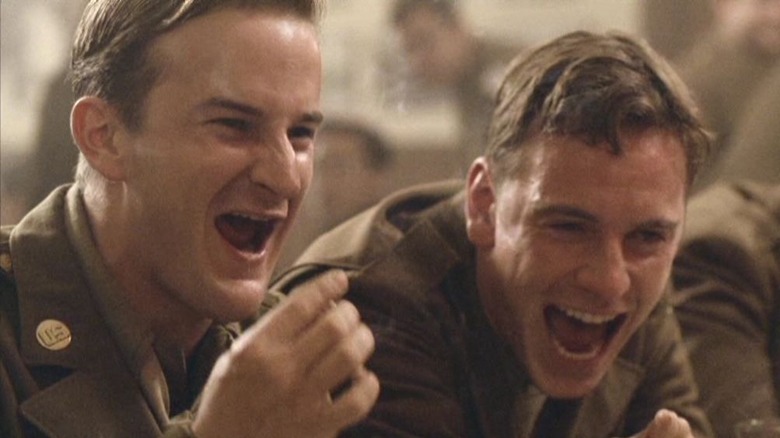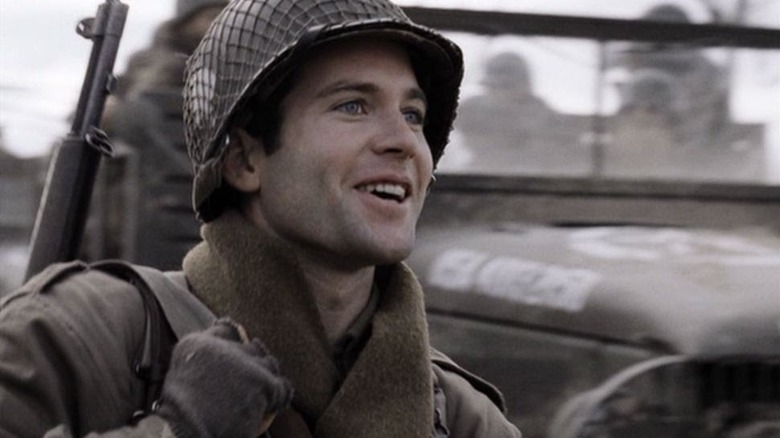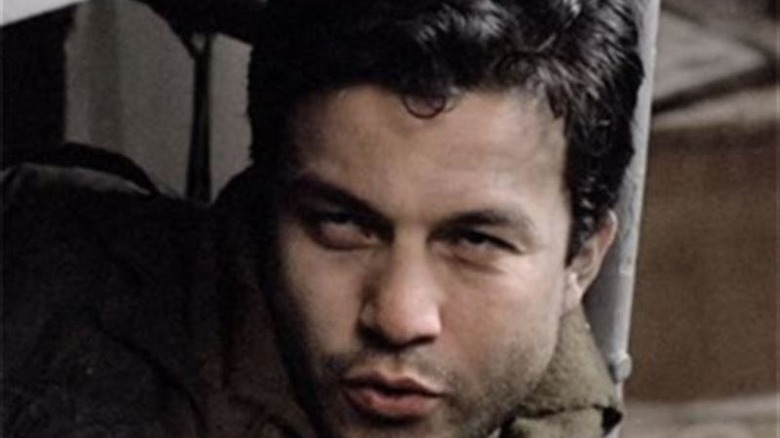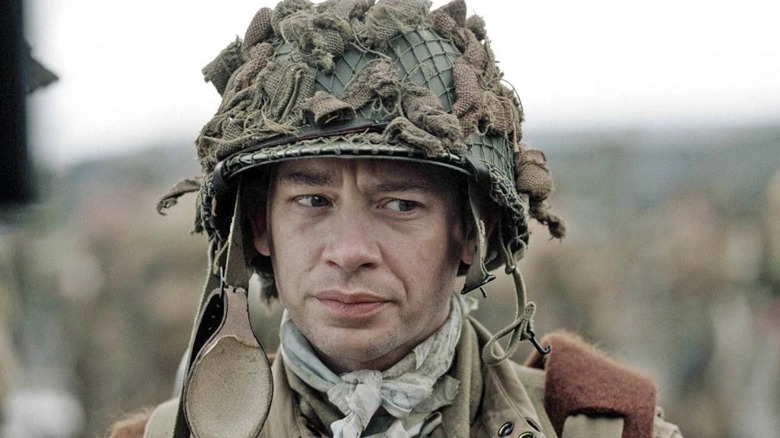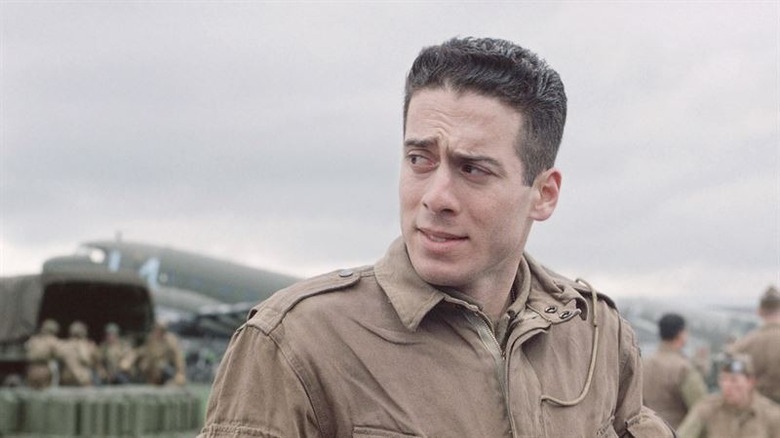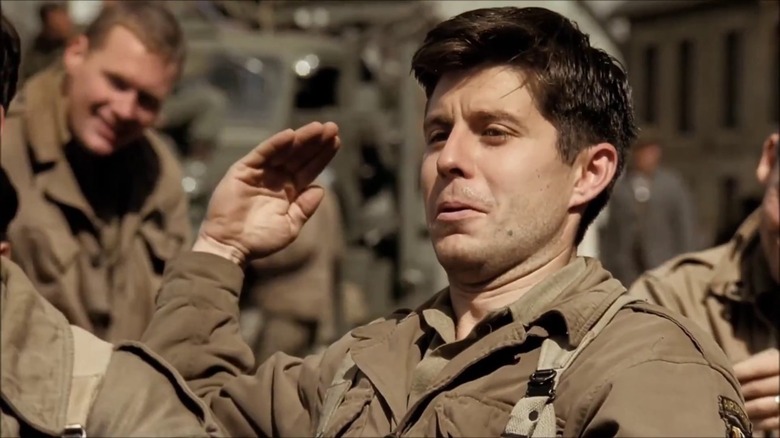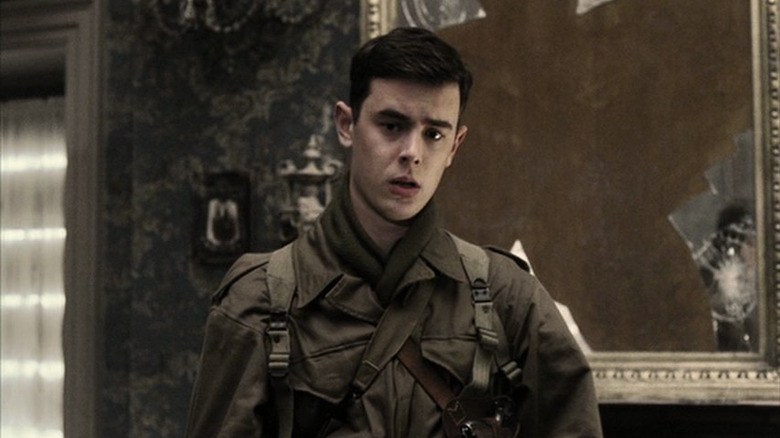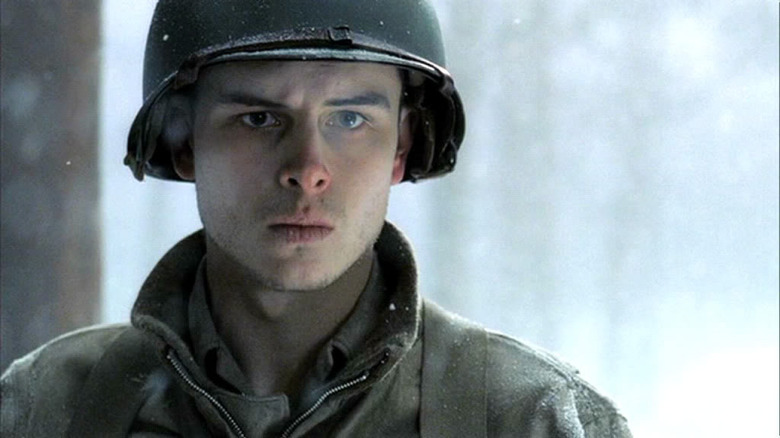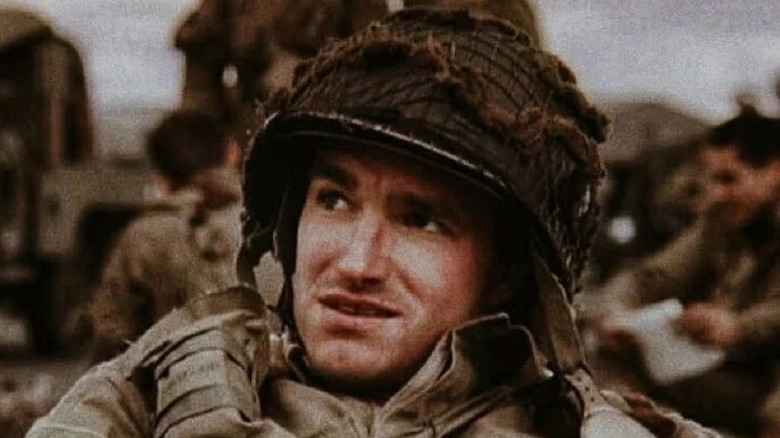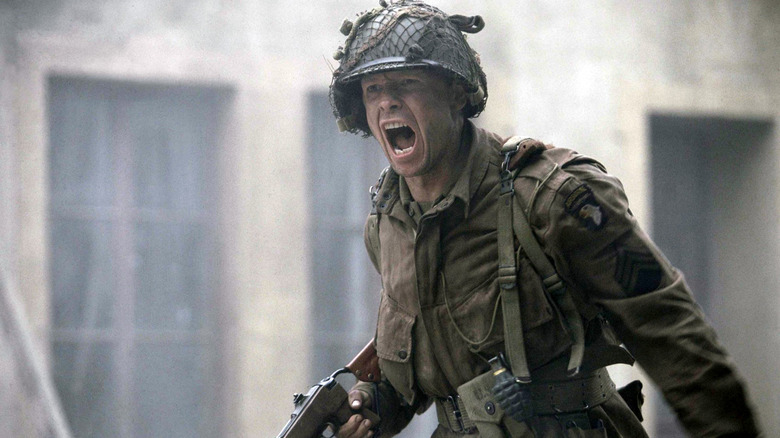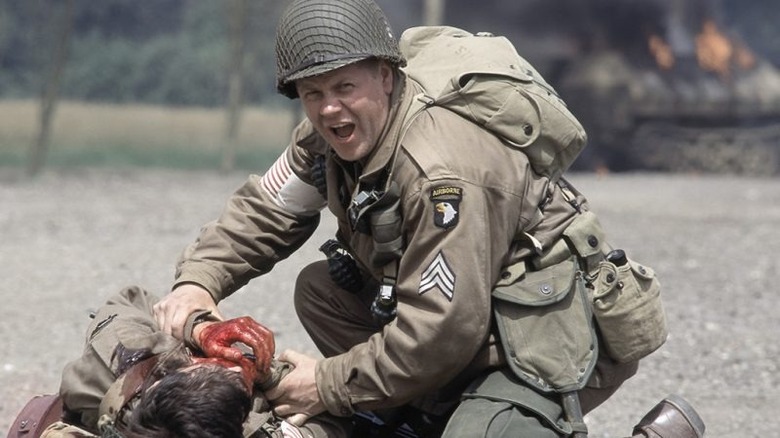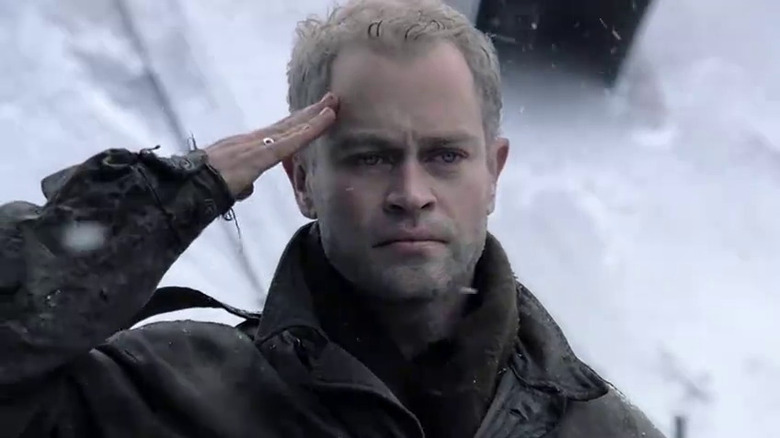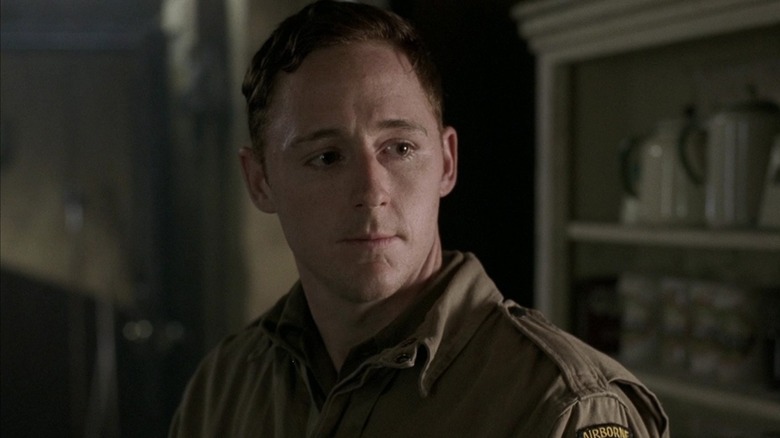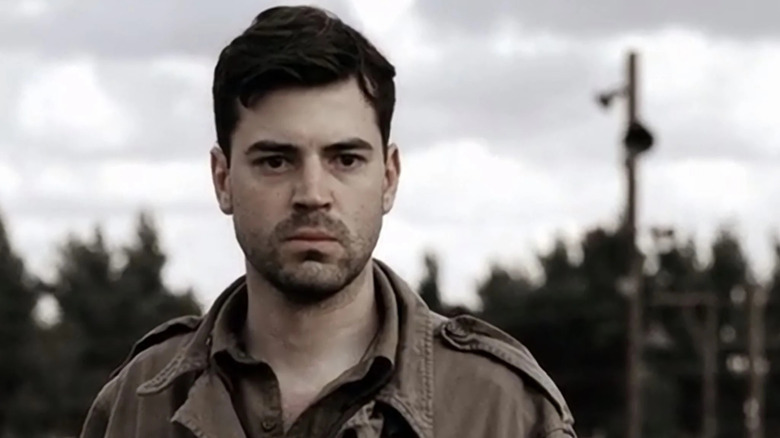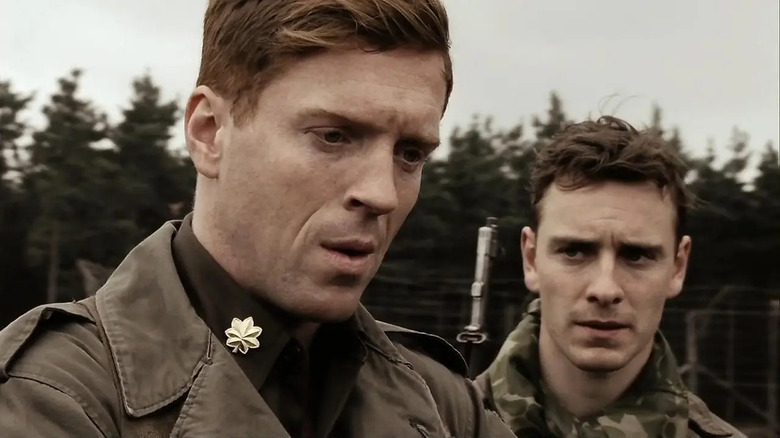Every Main Character In Band Of Brothers Ranked Worst To Best
The true stories of heroism in World War II have inspired some of the greatest films of all time. Throughout film history, war films have examined various aspects of combat. While films like "Saving Private Ryan" and "The Thin Red Line" explored the plight of soldiers in the heat of combat, "Bridge On The River Kwai" deconstructs the moral dilemma that prisoners of war faced.
Given how many classics have been made about the conflict, television would have to take a different approach when Tom Hanks and Steven Spielberg teamed up to create the excellent HBO miniseries "Band of Brothers." "Band of Brothers" follows the exploits of "Easy" Company, 2nd Battalion, 506th Parachute Infantry Regiment, of the 101st Airborne Division throughout the war. The series is notable for its massive cast, which paid tribute to the real men that played a role in the conflict. It's an unparalleled account of war.
Here is every main character in "Band of Brothers," ranked worst to best.
20. Herbert Sobel
"Band of Brothers" aired in 2001, which was right when many viewers were tuned into "Friends" each week. The sitcom had become one of the biggest hits in television history, so it may have taken some of the "Band of Brothers" audience by surprise to see David Schwimmer in a more dramatic role. He brings an intensity to his performance as Herbert Sobel that couldn't be more different than Ross.
Herbert Sobel serves as the first commander of Easy Company and trains them as drill instructor before they enter the field of combat. The training sequences in "Band of Brothers" are much more in-depth than most World War II films. Instead of montaging through the drills, the series takes the time to explore how the soldiers bond and develop their personalities. Unfortunately, they often clash with Sobel, who comes off as an arrogant leader. This should not indicate any disrespect to the real Sobel, but as presented in the series, he's rather unlikeable.
Later in the series, Sobel is unable to command a company during the midst of conflict. Due to his ill-advised strategies and poor mapping skills, his orders draw the ire of the other men in the company. He eventually transfers. While the series could have taken more time to explore his reasoning, Sobel isn't presented in a very compelling way.
19. Antonio Garcia
One of the best aspects of "Band of Brothers" is that it does not paint all of the characters as the same. Even though they bond over their shared experiences, each character has to deal with specific issues based on where they come from. Antonio Garcia (Douglas Spain) has a particularly interesting story. He had to borrow a friend's medication to pass his medical examination to enlist as a paratrooper. This is an element of the story that could have been developed further in "Band of Brothers." Unlike its sister series, "The Pacific," "Band of Brothers" does not spend as much time focused on the soldiers' lives before the war.
Audiences got to see Garcia's bravery during the brutal Battle of Nuenen. Like the other men in the company, he is horrified to see the death of Pvt. James W. Miller (James McAvoy). Douglas Spain does a great job of showing Garcia's shock as he reacts to the moment. Thankfully, the real Garcia survived the conflict, and the show reveals details about his later life.
While Garcia could have used more screen time in "Band of Brothers," he had the pleasure of watching it when it aired. During the filming of the series, he became close with Spain and was able to give him insight into what he remembered. However, Garcia did note that the series took some liberties.
18. Ronald Speirs
Matthew Settle does an excellent job showing the way that Captain Speirs has been affected by the conflict. He develops a no-nonsense personality and earns a reputation for his brutality. His singular focus on the art of combat makes him terrifying in some sequences. It allows the series to show a more complex version of heroism. The savagery of men in combat would be fleshed out in more detail in "The Pacific," but Speirs' story arc speaks to many of the same themes. He even tells one of the soldiers under his command that "The only hope you have is to accept the fact that you're already dead."
Settle deserves credit for the dramatic range he brought to the part. Unlike some of the other series regulars, he was a relative unknown before he was cast in the series. However, his downbeat attitude can also be a distraction, so he is ranked near the bottom of this list.
17. Frank Perconte
"Band of Brothers" is not an easy series to watch. The graphic violence is not for the faint of heart, and the series has been praised for its attention to detail by real veterans. Although it might be challenging for some viewers to get into such an intense miniseries, there are still glimpses of humor throughout. One of the more comedic characters in the series is Frank Perconte (James Madio). Adding humor to the series could have been insensitive, but Perconte's remarks do a great job of showing the friendship that grows between the soldiers.
If Perconte was only used for comedic relief, it could have been disrespectful to a real hero. However, the series does not shy away from showing his bravery during several key battles. Perconte joins other units while they elude Nazi forces in a farmhouse during the invasion of Normandy. It's an intense sequence, especially when Perconte and his companions launch a surprise attack to catch the enemy off guard.
Perconte ranks lower on this list because his storyline isn't quite as emotional as the characters above him. That being said, Madio does a great job at adding flourishes of personality to the role. He reveals during a conversation with Private Albert Blithe (Marc Warren) that he collects the watches of dead German soldiers. Perconte's remarks about Sobel's brittleness are particularly apt. He is just as annoyed with Sobel as the audience.
16. Robert Sink
One of the challenges that a series like "Band of Brothers" faces is making it seem as if the actors have real combat experience. That wasn't an issue for Dale Dye, who portrayed Colonel Robert Sink. In real life, Dye served in Vietnam War and was decorated for his service. Dye brings respect to the military by portraying realistic characters in war films and shows. Besides "Band of Brothers," he has also appeared in "Platoon," "Rules of Engagement," "The Last Full Measure," and the "Medal of Honor" video game series. He had a lifelong fascination with World War II that came from his childhood experiences listening to local veterans tell their stories.
In addition to giving a phenomenal performance, Dye insisted on helping the series maintain historical accuracy. He served as a consultant to the creative team and coached the other actors in a boot camp. He worked with several real veterans in overseeing the production. While it's important to recognize Dye's behind-the-scenes role, it does not discount the part that he plays in the series. Sink helps start Easy Company on the right note by reassigning Sobel, and his commands provide context to several key missions.
The only reason that Sink ranks lower on the list is that the younger characters are more engaging. While it's important to see some of the leaders, there's an underdog quality to the youthful soldiers that makes them more relatable.
15. Warren Muck
"Band of Brothers" is an emotional series, and the deaths of several real heroes are depicted with respect. Among the men killed in combat is Warren Muck (Richard Speight Jr.), who is killed in the Battle of the Bulge. The series does a good job of fleshing out the known details about Muck's service. As in real life, there aren't many accounts of the battles that he participated in.
Despite the emotional weight of his death, he isn't given as much screen time in the earlier scenes. There is an intriguing storyline in which Muck is separated from his fellow soldiers during D-Day, and it is rewarding to see him find his way back to Easy Company.
While it's a smaller role, Speight felt that Muck (who goes by the nickname "Skip") represents the most important themes of the series. He felt that Muck "serves as an enduring example of one who thinks not of himself, but of the people and the world around him." Speight said that Muck's heroism can't be explained by "some special power, some unique gift he and others like him possess that we regular folk don't." He's simply a young man who found his inner courage and made the ultimate sacrifice.
14. David Kenyon Webster
The personal accounts of several characters in "Band of Brothers" helped shape the series. David Kenyon Webster (Eion Brailey), who is transferred to Easy Company from Fox Company, wrote about his experience in several articles for the Saturday Evening Post. Before the war, Webster was a well-educated scholar, so his gripping articles helped shed light on everything that he saw. The 1994 biography "Parachute "Infantry: An American Paratrooper's Memoir of D-Day and the Fall of the Third Reich" also recounts his story. Webster's estate allowed HBO to use his insights and personal comments in the series. As a result, Webster gets a standout role in the episode "The Last Patrol."
"Band of Brothers" has a sprawling ensemble, so having an episode that focuses on one specific character was a change of pace. Following his extended stay at a hospital after being injured, Webster is assigned to a new post. There is an interesting tension that emerges between him and his new companions. The other soldiers are annoyed that Webster has managed to escape some aspects of duty because of his injuries. The episode does a great job of focusing on Webster's friendship with Henry Jones (Colin Hanks), a recent West Point graduate who also struggles to fit in.
Webster and Jones earn respect after they search for prisoners of war. It's rewarding to see them gain acceptance, but Jones is the slightly more relatable character.
13. Joseph Ramirez
"Band of Brothers" has all the hallmarks of a great war epic: There are grand speeches, rousing moments, and heartfelt conversations. However, there is an underlying complexity to the way that "Band of Brothers" addresses its social themes. Not every man in Easy Company has the same experiences. During World War II, there was still racial discrimination in nearly every aspect of American life. Although it's not called out in a major way, the series gives the underlying impression that Joseph Ramirez (Rene L. Moreno) faces challenges due to his Hispanic heritage. There is a subtle silence to Moreno's performance that signifies that he may fear speaking out.
Moreno does a great job of showing how the character's trauma affects him. He participates in almost every major battle and gets some true moments of heroism during the Battle of Bastogne. Easy Company is forced to endure painfully cold weather in the Ardennes forest. As their food and medical supplies dwindle, the soldiers' spirits steadily decline.
It's very moving to see how Ramirez endures this experience. While "Band of Brothers" gave breakout roles to many of its stars, Moreno has not had many major parts since his appearance in the series.
12. John Martin
"Band of Brothers" spawned some emerging filmmakers. Future director Dexter Fletcher has a regular role in the series as Staff Sgt. John Martin. Fletcher would later co-star in the Guy Ritchie films "Lock, Stock, and Two Smoking Barrels" and "Layer Cake" before beginning his career as a director. He went on to direct the British crime thriller "Wild Bill," the inspirational sports film "Eddie the Eagle," and the masterful Elton John biopic "Rocketman." There's an earnestness and ingenuity in Fletcher's films, so perhaps he learned a thing or two from working on one of the greatest HBO miniseries ever made.
Martin is a bit of a loner, but given his situation, that is certainly understandable. Martin recognizes that as a staff sergeant, he's bound to be assigned grunt labor tasks, and he's not particularly optimistic about being promoted. He eloquently explains the difference between being "wounded" and being "injured" in a conversation with Muck, Alex Penkala (Tim Matthews), Ken Webb (Jordan Frieda), and George Luz (Rick Gomez).
Although Martin mostly keeps to himself, he does share a few interesting interactions with Perconte. They have somewhat playful banter. Perconte tells Martin that "If you had any class or style like me, somebody might have mistaken you for somebody." This shows that even an anti-social character like Martin needs a sparring partner. He could have used more screen time, so he ranks near the middle of the list.
11. Joe Toye
War films and television shows have to be very careful about their depiction of combat violence. While shying away from the graphic details of war could be deemed disrespectful, it's also important to not be exploitative of the real horrors that veterans go through. There is even more responsibility for a project like "Band of Brothers," which recounts a true story. Many survivors and their families could be affected by the show, as a series from HBO is bound to get more people interested in their stories. Thankfully, "Band of Brothers" shows how violence specifically impacts individual characters. Few stories are as profound as that of Joe Toye (Kirk Acevedo), who is severely injured at the end of the Battle of the Bulge in the episode "The Breaking Point."
Toye has a constant enthusiasm for service that makes him very endearing. While some of his fellow soldiers fear going overseas to fight, Toye claims that he is excited about the mission and that he plans to personally execute Adolf Hitler. He boasts that President Franklin Roosevelt would rename Thanksgiving "Joe Toye Day" in his honor. Toye lives up to the reputation he creates for himself. He survives critical injuries during Operation Market Garden and the early part of the Battle of the Bulge. Each time, he's able to escape from the hospital and rejoin the company. However, Toye loses his legs in "The Breaking Point." It's one of the most difficult scenes to watch.
10. George Luz
There's no better source of comic relief in "Band of Brothers" than George Luz. Many of the soldiers feel that they are unimportant and that their actions and concerns will never affect their superiors' decisions. Luz puts everything in perspective. Everyone has someone they're taking orders from, and Luz makes his brothers-in-arm laugh with his comedic impersonations of the commanding officers. Luz's impression of Sobel is particularly humorous, considering how unlikeable that character is. As he notes Sobel's strict nature, Luz quips "How do you expect to slay the Huns with dust on your jump wings?"
The circumstances that the soldiers face are often surreal, and Luz is able to bring the absurdity of their situation to light. That speaks to the larger themes that "Band of Brothers" addresses. War is banal and ugly, and patriotism has a price. Luz's commentary is particularly helpful during the events in Bastogne. With dwindling food and supplies, Easy Company needs someone to lighten the mood. Yet, this doesn't mean that Luz lacks any moments of heroism. His reaction to Muck's death is heartbreaking.
9. Henry Jones
Being the son of one of Hollywood's most beloved actors certainly gives you some advantages. While the fact that Colin Hanks appears in an expensive HBO series that his father produced could be seen as nepotism, the younger actor proved that he has the same earnest charm as his dad in one of the most moving episodes of the series. Hanks portrays Henry Jones, a fresh-faced lieutenant who forms a tight friendship with Webster in "The Last Patrol." Both men are in a relatable position. They feel that they have not yet earned the respect of Easy Company.
Despite having very little combat experience, Jones agrees to take part in a patrol mission. He's clearly in over his head, but it makes sense why Jones would make this decision. The soldiers have no idea how long the war will last, and they know that the only thing keeping them sane is the friendship that has grown between them. Jones doesn't want to be an outsider. He's willing to put himself in a dangerous position to show that he's just as brave as the other men who have been fighting for months.
Jones' straightforward demeanor and strict adherence to rules signify his youth and naive nature. Even though his appearance in the series is brief, its impact is enough to warrant a high ranking on this list.
8. Eugene Roe
"Band of Brothers" shows the importance of medical personnel in combat with the character of Eugene Roe (Shane Taylor). Roe is an earnest yet detached member of Easy Company. He does not engage in many personal conversations with the other soldiers and often chooses to refer to them by their last names. While he seems cold at first, Roe goes above and beyond in his duties. He swiftly avoids gunfire during battles so that he can return soldiers to the frontlines. This may explain why he's less personable. Roe has had to talk to men on their deathbeds, so perhaps he wants to avoid forming any personal bonds that could end in heartbreak.
Roe's high ranking on the list is mostly due to his heroism in "Bastogne." The audience gets to see the Battle of the Bulge from Roe's perspective, which casts the events of one of the war's most brutal conflicts in a new light. Roe is in a difficult position. He is willing to lay down his life in service but knows that he needs to survive to provide care to the other men.
Roe has a tragic relationship with Renee (Lucie Jeanne), a Belgian nurse he befriends. They bond over having to search through the aftermath of the battle and witness the devastation of the massacre. This storyline concludes in tragedy when Renee is killed during a bombing.
7. William Guarnere
Although "Band of Brothers" can be grueling to watch, the series has faith in the soldiers' ability to find their inner optimism. This is particularly difficult for William Guarnere (Frank John Hughes), the staff sergeant who Easy Company nicknames "Wild Bill." Shortly before he lands in Europe, Bill receives heartbreaking news. His brother has been killed in Italy. This exemplifies the conundrum that the soldiers face: If they can't protect their families from danger, then what are they fighting for?
However, Bill is able to work through these tragedies and still have an endearing personality. His ongoing friendship with Joe Toye adds some lighter moments to the devastating events of "Bastogne." Under heavy enemy gunfire, Bill charges into combat and rescues his friend, whose leg has been blown off. As he drags Joe back to safety, Bill is also gravely injured. He jokingly remarks to Joe that "I told you I'd beat you back to the States." His personable nature warrants a high place on the list, even if there's more complexity in some of the characters above him.
6. Carwood Lipton
The name "Band of Brothers" comes from the nonfiction novel of the same name by Stephen E. Ambrose. The title is a reference to a passage from the classic William Shakespeare play "Henry V." In the "Band of Brothers" series finale, "Points," Carwood Lipton (Donnie Wahlberg) quotes a passage from a speech that King Henry delivers in the play. Of all the characters that could've uttered these words, it makes sense that it would be Lipton. He is essential to maintaining order within Easy Company in dire circumstances.
In the episode "The Breaking Point," Lipton rises in Easy Company as they face heavy casualties in Belgium. The soldiers' spirits are deteriorating, and they have little reason to trust their new leader, First Lt. Norman Dike (Peter O'Meara). Dike is frequently absent from duty. However, Lipton is able to ensure that the soldiers are committed to their mission and becomes the leader that they need. He leads them to victory during the assault on Foy. Despite the brevity of his appearance, Lipton deserves a high ranking because of how he helped the company emerge from decline.
5. Denver Randleman
In "Band of Brothers," many of the more comedic characters are also the bravest. Denver Randleman (Michael Cudlitz), the cheerful staff sergeant that Easy Company calls "Bull," embodies the perseverance of the soldiers in his spotlight episode "Replacements." The episode begins on a tense note, as the veteran members of Easy Company are skeptical of the "replacements" that are integrated into the unit. They did not fight in Normandy. It's slightly uncomfortable to watch their distrust, but Randleman's good-natured attitude offers some moments of levity.
During the battle in Nuenen, Easy Company is forced to retreat, and Randleman is left behind. He is forced to survive an entire night alone in enemy territory. The episode is very intense. Randleman is wounded and hides in a barn surrounded by the enemy. Any sound that he makes could spell his doom. It's rewarding to see him survive, and that earns him a high ranking on the list.
4. Lynn Compton
Lynn Compton (Neal McDonough), also known as "Buck," has one of the best character arcs in "Band of Brothers." It is interesting to see how the series shows the characters' development over time as they adjust to the reality of their situation. Initially, Compton is warmhearted and chooses to spend his time among the other soldiers. Even though he is a first lieutenant, Compton feels that it's important to get to know each member of the company. He would not ask anyone to do something that he would not be willing to do himself.
However, Compton is incredibly traumatized during the events of "The Breaking Point." He is devastated to see both Toye and Bill have their legs blasted off in the Battle of the Bulge. He had been close with both of them. Compton cannot bear to see his companions brutalized. Despite his generally optimistic nature, Compton suffers from a mental breakdown. He has to be pulled from the line as he spirals into self-doubt.
However, the soldiers who love Compton come to his aid. They show their appreciation for the man they can count on. It is one of the most touching moments of the series. This earns Compton a ranking near the top of the list.
3. Donald Malarkey
Who would have thought that Steve Smith from "American Dad!" could be such an engaging dramatic actor? Scott Grimes certainly has range. Although his "Band of Brothers" character, Donald Malarkey, does not receive a spotlight episode, his optimistic nature makes him one of the most pleasant characters in the series. There is a youthful enthusiasm in Malarkey that speaks to some of the series' deeper themes. What does it say about the state of the world that we are forced to rely on men who aren't much older than boys?
Malarkey earns a place near the top of the list due to a powerful scene that he shares with a German prisoner of war in Sainte-Marie-du-Mont. Malarkey learns that the young German is from Oregon, which is also where he grew up. The German says that he had to "answer the call" to preserve the Aryan race. This forces Malarkey to think about his home state and the people he is fighting in a completely different way.
2. Lewis Nixon
Ron Livingston is one of the most underrated actors working today. Although comedy fans may know him best from his iconic role in "Office Space," Livingston has been giving outstanding dramatic performances in interesting projects throughout his career. He gives one of the most well-rounded performances in "Band of Brothers" as Captain Lewis Nixon, a close friend of Richard Winters (Damien Lewis). He is an important part of the story from the very beginning, as he helps Winters train the soldiers during boot camp to prepare them for their mission.
Nixon gets a spotlight episode with "Why We Fight," the penultimate installment in the series. He searches through German territory to find his favorite whisky, Vat 69. However, he receives a letter from his wife, in which she reveals that she is filing for divorce. This, coupled with seeing the devastation of the area, changes Nixon's point of view. He is ultimately able to emerge from this turmoil after he finds a wine cellar. Nixon's impact on the series is unparalleled. Ultimately, he is the one who gets to reveal to Easy Company that Hitler is dead.
1. Richard Winters
There could only be one character who deserves the top spot. Major Richard Winters, also known as "Dick," is the leader that sees Easy Company through all the perils of war. He exemplifies the best leadership qualities. Winters is unafraid to question the authority of his superiors when he feels that they are misjudging the situation. He retains his honor when other soldiers perpetrate cruelty. While he is serious, he is also a friend to the men under his command.
It is fitting that Winters' spotlight episode is the series finale, "Points." It's Winters who, in a moving voiceover, explains what happened to each of the characters after the war as they engage in a friendly game of baseball. Winters is content to see his men taking a moment to find joy and only stops the game for a brief moment so he can announce that Japan has officially surrendered. Although the soldiers applaud the end of the war, it feels like they are also cheering for Winters.
